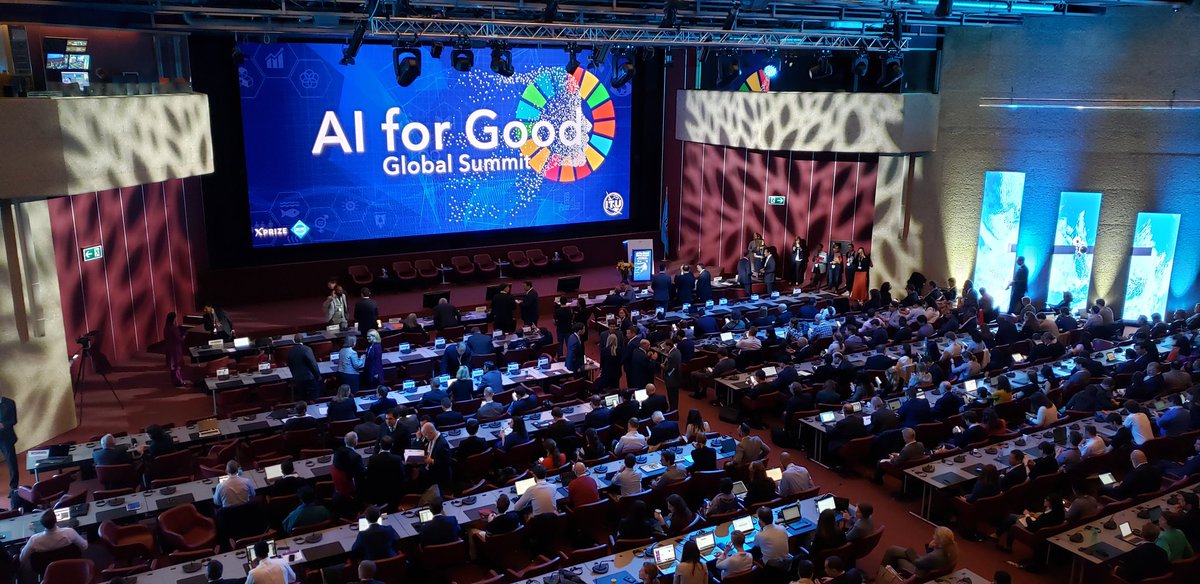The AI for Good Global Summit — the leading UN platform for inclusive dialogue on AI — was hosted by the ITU in partnership with UN sister agencies in Geneva between 27-31 May. Leading minds in AI, business, government and civil society examined practical applications of AI for economic development and social good.
Access Partnership’s panel “AI Governance in Developing Nations – Elements for a Roadmap” was the central event of the Public Sector & AI track. Our own Erika Barros Sierra moderated a panel of experts including Christopher Akiwumi (Director, Microsoft Government Affairs, Africa and Middle East) and Eric Lewandowski (Global NGO Lead, Orbital Insight) and Arturo Robles (Commissioner at the Mexican ICT Regulator).
Panelists noted that AI has potential to solve some of the most pressing challenges facing emerging economies by improving access to public services, enhancing policy-making, greater financial inclusion and an increasingly productive and efficient agriculture sectors. The experts acknowledged the importance of ensuring AI associated risks are addressed and benefits are within reach of those who need it most. All agreed that a concerted effort combining between public and private actors would be required to establish a robust governance framework for AI in regard to connectivity, data privacy, intellectual property and cybersecurity.
Other tracks and discussions highlighted fascinating topics concerning the development of AI solutions to address some of the world’s most pressing challenges, including:
AI Education and Learning
Discussions emphasised how AI can be used to unlock individual potential and amplify a sense of agency and purpose. However, leveraging this technology requires us to reimagine education and develop long-term and creative solutions as we identify problems and address multi-cultural challenges. In any case, participants agreed that we are long away from fully understanding the technology and its potential.
Good Health and Well-Being
AI and machine learning can revolutionise healthcare in terms of clinical decision support, personalised medicine, augmented diagnosis capabilities, medical imaging interpretation, therapeutic purposes and disease prevention. Participants touched upon sectoral challenges, including issues of processing, benchmarking AI algorithms, and creating standardisation processes for the responsible adoption of algorithmic decision-making tools.
Human Dignity and Inclusive Societies
While existing projects address equality and inclusion issues in AI, participants acknowledged the need for greater mobilisation of major stakeholders in the AI community to support these efforts, inclusion, and human dignity on a regional, national, and international scale. Indeed, increased partnerships can help alleviate inequality within the sector.
Scaling AI for Good
This track identified ways to scale the number of applications and deployments to better meet the UN’s Sustainable Development Goals (SDGs). For example, successful projects in Internet infrastructure and global supply chains that have scaled globally were showcased to raise awareness of different tools available to scale AI solutions.
AI for Space
Out of this world, AI techniques can be applied to space datasets and accelerate progress towards the SDGs. Indeed, space and AI play an integral role in protecting our planet. For example, participants introduced the concept of “planetary stewardship” and explored how predictive AI capabilities can be leveraged to comprehend complex environments at a local and global scale.
Sessions generated dialogue between the AI and space sectors, policy-makers and humanitarian organisations to establish broad principles around governance for AI and space, specifically regarding data accessibility, trust, algorithmic inequity, accountability, and use and misuse.
The four-day event delivered a series of fascinating discussions on AI and its potential for human development. One thing was clear: we have barely scratched the surface of how AI-led transformations will reinvent our lives and how they will shape the future of societies worldwide. Integrating AI as a public good is a global challenge that impacts the ability of governments and global institutions to safeguard the interests of their constituents.
Governments need to develop a forward-thinking, holistic, and inclusive perspective to leverage AI solutions and harness its potential to meet national challenges. Stakeholders must continue to work together, explore new ideas, challenge existing narratives and bridge understandings of AI and its unlimited possibilities. There is no room for fear if we are to ensure their potential benefit to humans everywhere. We must remain curious and seek to work towards inclusion so that no one is left behind.
Author: Erika Barros Sierra, Manager, International ICT Policy, Access Partnership
